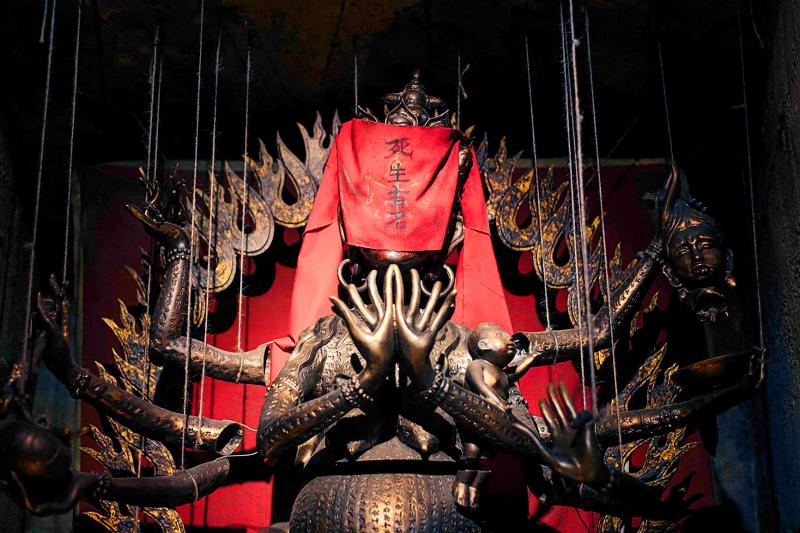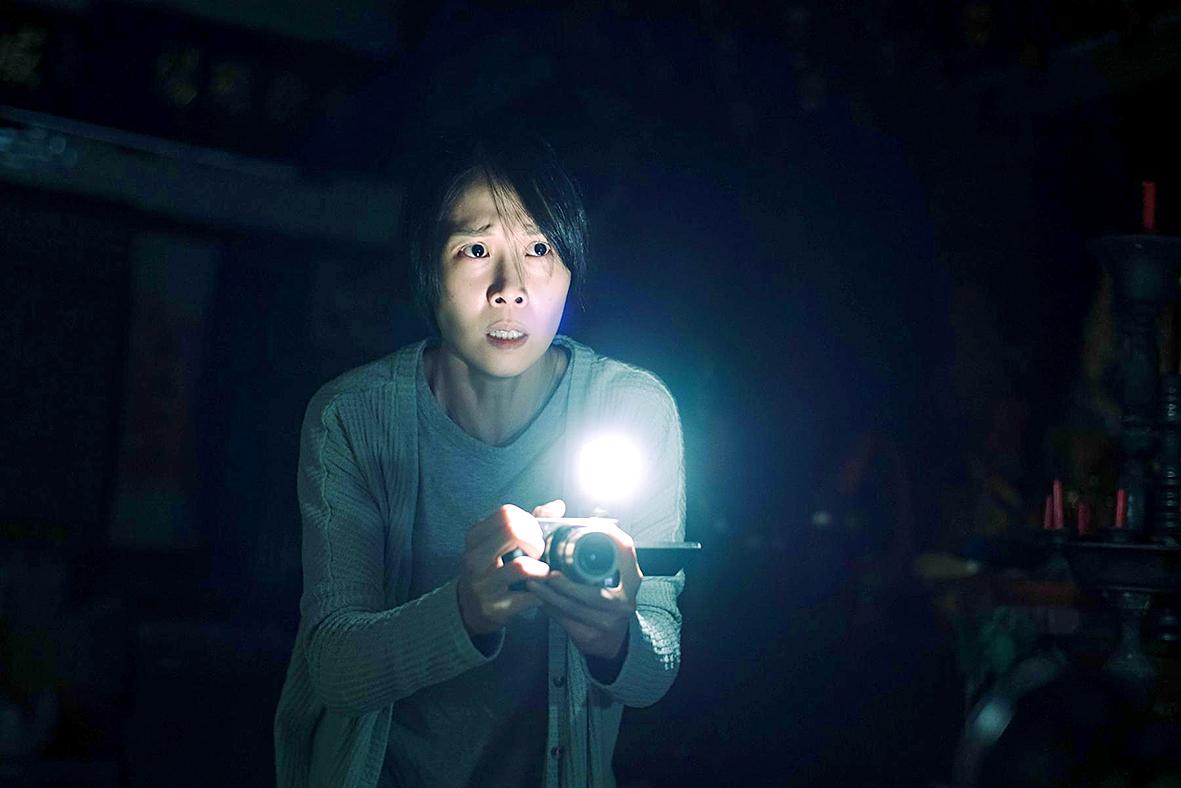Tragic protagonist Ruo-nan (Tsai Hsuan-yen, 蔡亘晏) asks the audience to memorize a symbol and repeat an ominous chant in the opening scene of Incantation (咒). It’s hard to resist the instructions whether you believe in folk religion or not, especially when she adds that reciting it silently works too.
The interactive element is not just a gimmick. It plays an unexpected part in the plot later on. Unfortunately, it is the only intriguing part of the film, which lacks a compelling story to ground the suspense. Incantation is mostly a run-of-the-mill found-footage horror flick that relies on hackneyed scare tactics, gore and stereotypical characters who arouse little sympathy.
The market for horror remains strong seven years after the overwhelming success of The Tag-Along (紅衣小女孩). Incantation, which explores the “uncharted territory” of local cults, touts itself as the “scariest Taiwanese film ever made.”

Photo courtesy of Activator Marketing Corp
This hype helped the film enjoy immense box office success, earning a nation-topping NT$23 million over its first three days in theaters. However, the devices and elements of this genre are getting a bit old, and every film seems to use more or less the same imagery and style choices. What’s really needed is a fresh and gripping tale, but Incantation fails to live up to its promise.
Horror films are not supposed to make complete sense, but in what world can someone snatch her daughter from child protection services, and in front of the police no less, and later bring her to hospital horribly malnourished and covered with putrid sores and syringe marks without any consequences? Even if poor Duoduo (Huang Hsin-ting, 黃歆庭) is really cursed, nobody questions Ruo-nan’s behavior or parenting. She’s even allowed to roam around the facilities where she causes even more harm.
This is just one of many inconsistencies that arise throughout the Incantation, starting with the tired premise. Six years prior to the film’s beginning, a pregnant Ruo-nan, her boyfriend A-tung and his brother A-yuan are running one of those “ghostbusters” YouTube channels that seem to appear in every other horror film these days. Their latest mission is to infiltrate a religious ritual hosted annually by the family of A-tung and A-yuan deep in the mountains. They also plan to sneak into a forbidden cave.

Photo courtesy of Activator Marketing Corp
Of course, they act recklessly, defacing the temple’s gate with graffiti while smashing doors and sacred objects. It turns out that the clan is part of an evil cult that originated in Southeast Asia, and they have to carry out this grim ritual every year to prevent disaster.
The real-life events that the story supposedly draws from are far more spine-chilling than what happens in the movie. In 2005, a family of six in Kaohsiung reportedly became possessed by various deities and brutally tortured each other for a month while subsisting only on water mixed with charm ashes, leading to the death of the eldest daughter. It’s hard to see the connection between the movie and real-life events — except, perhaps, that religion can create illusions in the mind of believers.
It’s not entirely clear what happens to the clan after the YouTubers disrupt the ceremony. Ruo-nan survives since she didn’t enter the cave, although she brings great misfortune to anyone around her. Duoduo is placed in foster care after she is born, but after years of therapy, Ruo-nan is deemed well enough to take her daughter home.
The harrowing events of the first night — creepy voices, lights turning on and off, objects moving on their own and Duoduo acting possessed — should have been enough warning that the curse is still in effect, but Ruo-nan seems to pretend things are fine even as Duoduo’s condition rapidly deteriorates. Would this have happened if Ruo-nan left Duoduo in foster care, or is this all part of her plan to release the curse? The answer isn’t apparent.
Every Taiwanese movie seems to need a touching family moment, and despite her actions, Ruo-nan, along with Duoduo’s former foster father Chi-ming (Kao Ying-Hsuan, 高英軒), are portrayed as devoted parents who will go to any length to save the child and preserve her happiness.
Like the family in Kaohsiung, Ruo-nan is doing what she believes is the right thing, but this question of perception is lost in the muddled mix.

On April 26, The Lancet published a letter from two doctors at Taichung-based China Medical University Hospital (CMUH) warning that “Taiwan’s Health Care System is on the Brink of Collapse.” The authors said that “Years of policy inaction and mismanagement of resources have led to the National Health Insurance system operating under unsustainable conditions.” The pushback was immediate. Errors in the paper were quickly identified and publicized, to discredit the authors (the hospital apologized). CNA reported that CMUH said the letter described Taiwan in 2021 as having 62 nurses per 10,000 people, when the correct number was 78 nurses per 10,000

As we live longer, our risk of cognitive impairment is increasing. How can we delay the onset of symptoms? Do we have to give up every indulgence or can small changes make a difference? We asked neurologists for tips on how to keep our brains healthy for life. TAKE CARE OF YOUR HEALTH “All of the sensible things that apply to bodily health apply to brain health,” says Suzanne O’Sullivan, a consultant in neurology at the National Hospital for Neurology and Neurosurgery in London, and the author of The Age of Diagnosis. “When you’re 20, you can get away with absolute

May 5 to May 11 What started out as friction between Taiwanese students at Taichung First High School and a Japanese head cook escalated dramatically over the first two weeks of May 1927. It began on April 30 when the cook’s wife knew that lotus starch used in that night’s dinner had rat feces in it, but failed to inform staff until the meal was already prepared. The students believed that her silence was intentional, and filed a complaint. The school’s Japanese administrators sided with the cook’s family, dismissing the students as troublemakers and clamping down on their freedoms — with

As Donald Trump’s executive order in March led to the shuttering of Voice of America (VOA) — the global broadcaster whose roots date back to the fight against Nazi propaganda — he quickly attracted support from figures not used to aligning themselves with any US administration. Trump had ordered the US Agency for Global Media, the federal agency that funds VOA and other groups promoting independent journalism overseas, to be “eliminated to the maximum extent consistent with applicable law.” The decision suddenly halted programming in 49 languages to more than 425 million people. In Moscow, Margarita Simonyan, the hardline editor-in-chief of the